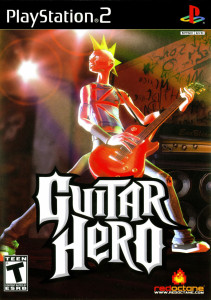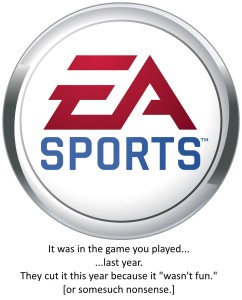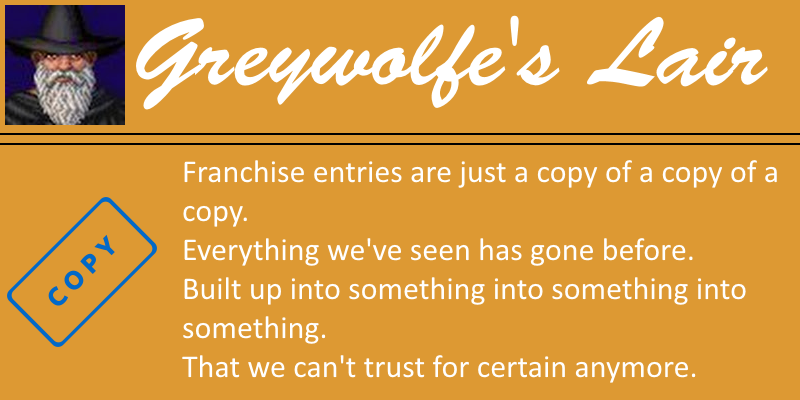I don't play as many games as I used to. Part of the reason for this has to do with the fact that I'm just more picky now: often, games only appeal to one of my senses and not all of them. As in, I can be swayed a little by the graphics. Or maybe I hear the soundtrack and I get pulled in by that. Or I watch gameplay and my mind starts considering those ideas.
Another part of the problem - especially when it comes to AAA gaming, has to do with the fact that all AAA studios and publishers know how to do is pump out sequels. It's even written into their language, in how they discuss their games - like they're brands and they're perennial and they have to "re-invigorate" those over and over again.
And it isn't doing the industry any favours. Let me tell you why.

The Rise And Fall Of Guitar Hero
Once upon a time there was this studio called Harmonix. They were doing pretty well for themselves coming up with music-based games. They finally settled on a pretty cool idea called "Guitar Hero" which sold like gangbusters. Activision saw them and took note. Seemed like a money-spinner. So they bought up the Guitar Hero license.
So far, so bad. Anything Activision touches will probably automatically turn to sludgy brown stuff YOU wouldn't want to touch. And, of course, it played out pretty much as you'd expect it would. Activision went for broke, spinning off Guitar Hero into other games. Putting out multiple entries in the franchise too close to one another. Making folks spend far too much money on DLC [a misnomer if ever there was one] that they couldn't, then, port to the next entry in the series.
Along the way, because these songs were all licensed - and only licensed for a specific amount of time, "Downloadable content" for each successive game began to disappear as those licenses ran out.
Activision - and no one else - killed the golden goose. And why? Because they were chasing profits over everything. Profit drove Guitar Hero to destruction.
But wait! There's more!

It should be a surprise to no one that EA Sports absolutely cannibalizes their own market year-on-year with games that simply have a new year descriptor attached to them. You might have played FIFA 15, but the very next year, FIFA 16 comes out with a whole new roster of players. I don't play annualized EA releases [I don't play EA games if I can help it anymore, for the most part] but I imagine that - in a middle-fingered salute to the fans, EA expressly doesn't let you move your players that re-appear from iteration to iteration. Instead, you have to encounter those players again - either through acquiring them the normal way or, of course, buying them in the EA marketplace. [Assuming that's how that works, of course.]
Naturally, if EA can do it and Activision have done it, you can bet Ubisoft won't be far behind. They are certainly running into franchise fatigue when it comes to their Assassin's Creed games. It doesn't help matters at all when one of the year's buggiest releases has to - somehow - pave the way for a new game in the franchise next year.
So we've established that market saturation is a problem in the modern industry. How can all of this be helped?
Everyone Needs A Break

Years ago, at Sierra On-Line there was a developer by the name of Roberta Williams. You may know her from such hits as King's Quest. Or you might have dabbled in her horror series Phantasmagoria. Or you might even have solved the murder mysteries that Laura Bow presented. The point is that Roberta Williams recognized a pair of things about the games industry that modern studios fail to grasp: your annualized franchises? They need a rest.
If you absolutely insist on chasing what seems like a "solid IP" for years to come, then start by giving players two or three years between iterations. Your players will thank you for it in many and varied ways, from making interesting fan art, songs and the like to still-ongoing conversations. More to the point, if there's a large-ish gap between releases, your fans will be only too happy to speculate on what the next game might hold. They will anxiously await news of the next outing in that franchise, hoping it is as good as the last.
This also gives the writers and developers a break. Time to de-stress and do something different. Allowing them the time they need to build up to working with that "solid IP" again in the future.
Another path of attack is to simply try new things. Not everything is destined to succeed, but you might find a grain of something interesting in a project that doesn't quite work out. Yes, this is a gamble, but then so is anything that happens to be creative. And you won't know until you try.
Small-scale efforts like Unravel, Valiant Hearts, Child of Light and games in that vein have done rather well for themselves, allowing those creative folks to breathe a little and try new things.
Lastly, always remember: Your "money spinning IP" was a "new, untested IP" at one point, too. That means it had to go through the growing pains of being adopted by gamers. It had to do the rounds with the critics. It had to grow up and become something. If you stopped this endless cycle of sequels, you might find that there are lots of new worlds and ideas that you could chase instead.
So, yes. Franchise fatigue is hurting the industry. But there are certainly things that can be done about it.
The copy image in the banner is courtesy of Pixabay.

